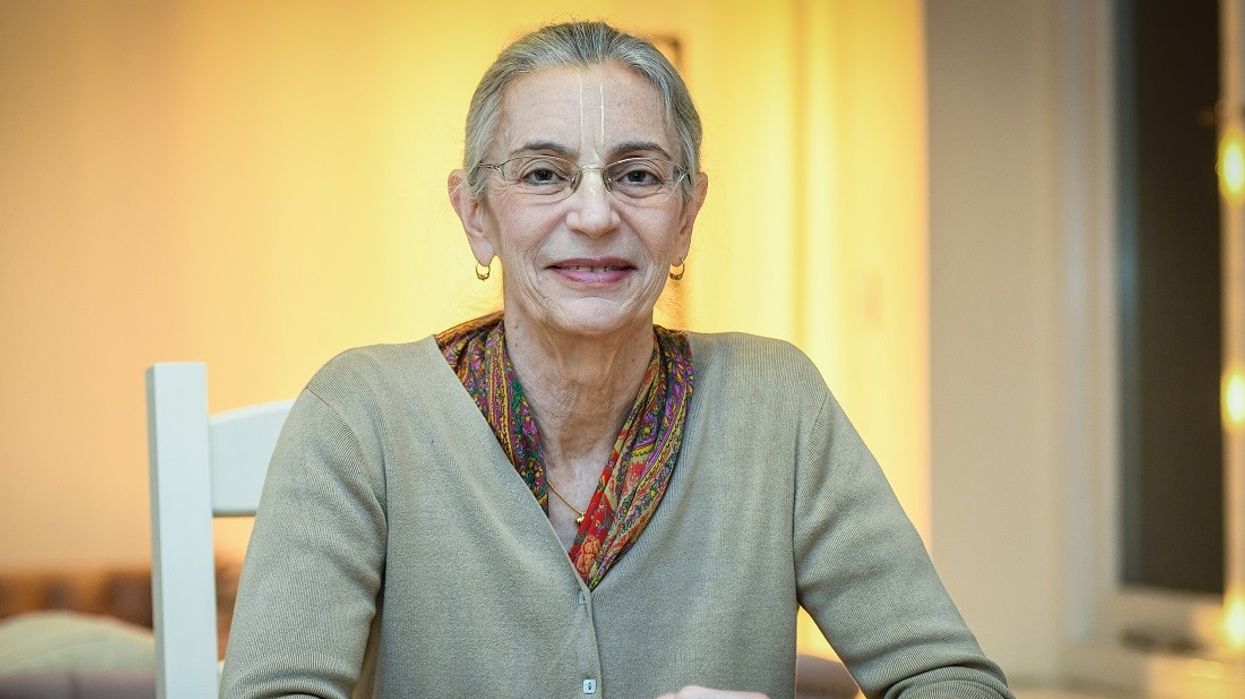A RITUAL is an act regularly repeated in a set manner. For our work, to stay healthy, for entertainment, for good sleep, and for a myriad of other reasons, we follow many rituals. And religiously also, we may follow many customary rituals.
Where I live and serve at Bhaktivedanta Manor in Watford, UK, on a special day we happily host thousands of pilgrims of all ages and from all segments of society. So many people visit us that day that they must stand in a queue for up to an hour in order to come before our beautiful altar where Sri Sri Radha Gokukananda, Sri Sri Sita Rama Lakshman Hanuman, and Sri Sri Gaura Nitai reside.
The founder and teacher of the Hare Krishna Movement (the International Society for Krishna Consciousness), Srila AC Bhaktivedanta Swami Prabhupada, explains the actual purpose of religious practices and rituals. “Religious practice for economic development or the satisfaction of sense desires should be avoided. Religious practices should be executed only to gain freedom from the clutches of material nature. It is stated in the beginning of Srimad-Bhagavatam that the topmost religious practice is that by which one can attain to the transcendental devotional service of the Lord, without reason or cause. Such religious practice is never hampered by any impediments, and by its performance one actually becomes satisfied… Generally, people execute religious practices for economic development or sense gratification, but that is not recommended.” (Srimad-Bhagavatam 3.28.3 purported)
To grasp what Srila Prabhupada is saying here, we need to establish the foundational teachings of the Bhagvad Gita and other great scriptures, namely that in the final analysis we are not the body and mind we’re currently inhabiting. We are actually spiritual beings, a tiny part of the supreme spirit, god. This simple fact has enormous implications.
It means that everything we gain materially, whether wealth, beauty, fame, knowledge, or power, is temporary and ultimately won’t satisfy us. Why? Because we’re not material beings; we’re spiritual. Our satisfaction lies in a realm beyond matter.
So, if we come to a temple or any place of worship as a ritual, appealing to divinity for economic development or any other material improvement, although it’s good that we’re approaching divinity, at the same time we’re missing an invaluable opportunity: the opportunity to, as Srila Prabhupada explains, “gain freedom from the clutches of material nature.”
As we’re increasingly noticing, this material world we’re in has (and has always had), grave problems. Droughts, floods, wars, forest fires, hurricanes, innumerable diseases, mental turmoil, exploitation, relationship breakdowns – the list of the causes of suffering is staggering. The plain reality is that, ultimately, we’re not meant to be in this world. There’s another world, the spiritual world, that’s our actual home; we’re meant to be in that world.
In the Bhagvad Gita, Sri Krishna clearly declares, “Engage your mind always in thinking of Me, become My devotee, offer obeisances to Me and worship Me. Being completely absorbed in Me, surely you will come to Me.” (Bhagvad Gita 9.34)
We’re meant to act honorably in this world while engaging our mind, words and senses in serving the supreme personality of godhead with devotion. This practice is not difficult; rather, it’s sublime. We can hear from and about Krishna through the Bhagvad Gita and other scriptures, we can offer our vegetarian food to him at home, we can visit his temple and pray to him for spiritual understanding and service. We can keep our material goals modest and our spiritual goals robust.
Granted, this reorientation of our consciousness and goals will put us out of step with the goals and desires of many of the people around us. And that’s a good thing, for material goals and desires are a dead end. Whatever we acquire materially is limited and temporary; ultimately whatever it is won’t satisfy us. We’re meant for something infinitely greater.
Let us all go to the temple or any other place of worship. Let us make our homes into temples. And let us perform daily religious practices in those places with all the humility and devotion at our command. But let’s not do these things for any material reasons; we are better than that. That’s like a penniless beggar asking the king of all the lands for ashes.
When we come before Krishna, we’re coming before the king of all kings. Our appeal to him can be, “How can I best serve you?” “How can I best please you?” Trying to do these things with sincere devotion will surely enable us to come to enter his kingdom.




